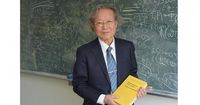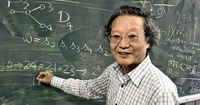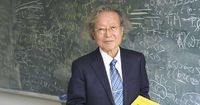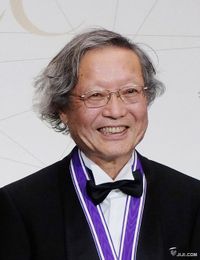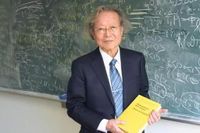On March 26, 2025, the Norwegian Academy of Science and Letters announced that Masaki Kashiwara, a 78-year-old specially appointed professor at Kyoto University's Research Institute for Mathematical Sciences, has been awarded the prestigious Abel Prize, often referred to as the "Nobel Prize of Mathematics." This marks a historic moment as Kashiwara is the first Japanese recipient of this esteemed award since its inception in 2002.
Kashiwara was honored for his groundbreaking contributions to mathematics, particularly for establishing the theory known as 'D-modules,' which serves as a cornerstone in the field of algebraic analysis. The academy praised him, stating that he has opened the door to new mathematics for over half a century, proving remarkable theorems in ways that were previously unimaginable.
The Abel Prize was created to recognize mathematicians who have made significant advancements in their fields, with a prize money of 7.5 million Norwegian kroner (approximately 107 million yen). The award ceremony is scheduled to take place on May 20, 2025, in Oslo.
Kashiwara’s journey into the world of mathematics began during his time as a student at the University of Tokyo, where he was inspired by lectures from the late Mikio Sato, a renowned mathematician. He later recalled, "I was astonished by the home-run level ideas. I learned that mathematics is something to be created by oneself." This realization set him on a path that would lead to his monumental contributions to the field.
Born in 1947 in Yuki City, Ibaraki Prefecture, Kashiwara has dedicated his career to the development of modern mathematics. He built the theory of 'D-modules' from the ground up, which has since become a central concept in algebraic analysis. His work has significantly influenced various areas of mathematics and has even impacted fields like physics and information science.
In the 1980s, Kashiwara solved the Riemann-Hilbert problem, a longstanding challenge that had perplexed mathematicians since the early 20th century. This achievement is just one example of his deep impact on the mathematical community. Over the years, he has received numerous accolades for his work, including the Japan Academy Prize in 1988 and the Chern Medal from the International Mathematical Union in 2018.
In an online interview released by the academy, Kashiwara expressed his disbelief and gratitude upon receiving the news of the award, stating, "It's unbelievable news. I am grateful that my work of over 50 years has been recognized." He is set to hold a press conference at Kyoto University on March 27, 2025, where he will likely share more about his research and the significance of the award.
The Abel Prize, established by the Norwegian government, is named after the mathematician Niels Henrik Abel and is regarded as one of the highest honors in the field of mathematics. It stands alongside the Fields Medal, which is awarded to younger mathematicians under the age of 40. While the Fields Medal is awarded every four years, the Abel Prize has no age restrictions and is awarded annually, making it a prestigious accolade in its own right.
Previous recipients of the Abel Prize include notable mathematicians such as John Nash, who was awarded the Nobel Prize in Economics for his work in game theory, and Andrew Wiles, who famously proved Fermat's Last Theorem. Historically, most winners have hailed from Europe and North America, making Kashiwara's award a significant milestone for Japan and its contributions to the global mathematical community.
As Kashiwara continues to inspire future generations of mathematicians, his recognition serves as a powerful reminder of the impact that dedicated research and innovation can have on the world. His achievements not only highlight the importance of mathematics but also encourage young scholars in Japan and beyond to pursue their passions and contribute to the advancement of knowledge.
In summary, Masaki Kashiwara's receipt of the 2025 Abel Prize is a momentous occasion in the field of mathematics, showcasing the remarkable contributions of Japanese scholars on the international stage. As the mathematical community celebrates this achievement, it also looks forward to the continued exploration and discovery that Kashiwara's work represents.
